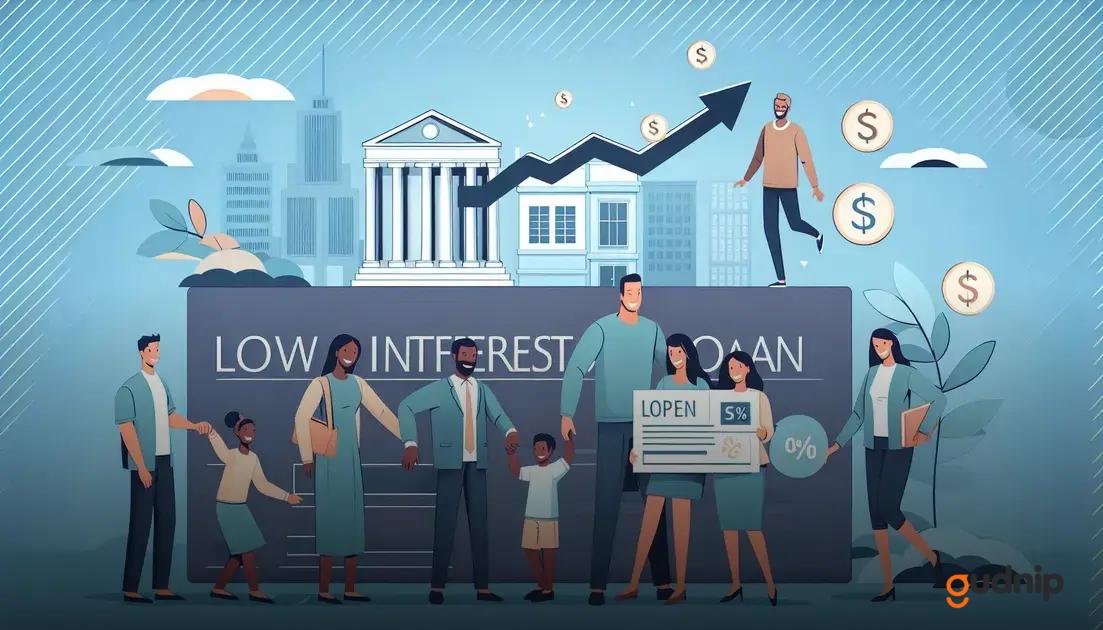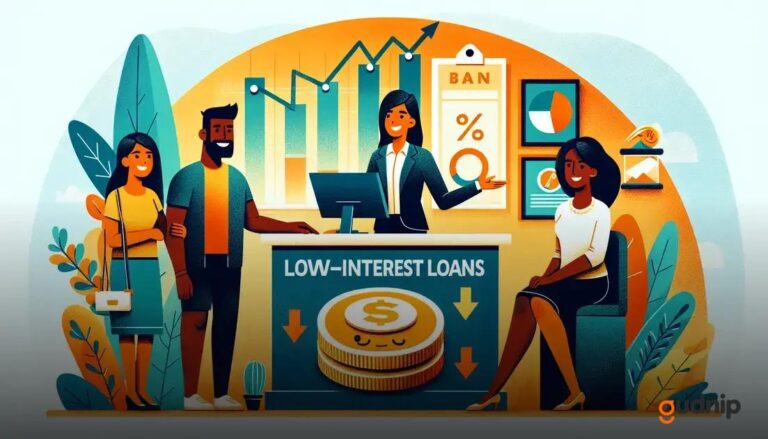Low-interest loans can be a game-changer for anyone looking to borrow money without accruing massive debt.
What are low-interest loans?
Low-interest loans are financial products with interest rates significantly lower than the market average. They are typically offered by banks, credit unions, and online lenders to attract borrowers looking for affordable repayment terms. By paying less in interest, borrowers can save money over the life of the loan.
These loans come in various forms, including personal loans, auto loans, and mortgages. The exact interest rate can vary based on the borrower’s credit score, income, and the lending institution’s policies. Creditworthiness plays a crucial role; individuals with higher credit scores are more likely to secure these loans at favorable rates.
Loan terms and rates are influenced by economic factors and the borrower’s financial profile. Typically, fixed-rate loans provide stability with a constant interest rate throughout the loan term, while variable-rate loans may start with low rates that could increase over time.
To access low-interest loans, borrowers often need to demonstrate strong financial health, providing proof of steady income and a positive credit history. Lenders may also consider the debt-to-income ratio to ensure that the borrower can manage monthly payments comfortably. Regular monitoring of one’s credit report and timely payment of existing debts can improve eligibility for these loans.
Benefits of choosing Low-interest loans

Choosing low-interest loans can lead to significant savings over the life of the loan. Lower monthly payments are one of the main advantages, making it easier to manage your finances. With reduced interest rates, more of your payment goes towards the principal amount, helping you pay off the loan faster.
Low-interest loans generally come with better terms and conditions, providing flexibility and financial stability. They can also improve your credit score over time, as consistent and reliable payments reflect positively on your credit report.
Another benefit is the potential for tax savings, especially if you secure a mortgage or student loan with a low-interest rate. Additionally, having a lower interest rate means you can afford to take out a larger loan if necessary, expanding your options for purchases and investments.
How to qualify for low-interest loans
To qualify for low-interest loans, it’s essential to understand the key factors that lenders consider. Here are some critical steps and criteria that can boost your eligibility:
Review Your Credit Score
Your credit score plays a significant role in the approval process. Lenders often offer lower interest rates to individuals with higher credit scores. Regularly monitor your credit report and address any discrepancies.
Maintain a Stable Income
Lenders prefer borrowers with a reliable and steady income. Ensure all your income sources are well-documented and consistent over a significant period.
Manage Your Debt-to-Income Ratio
Your debt-to-income ratio (DTI) is a crucial factor. Aim to keep your DTI under 36%. Paying down existing debts can improve your chances of qualifying for a low-interest loan.
Save for a Down Payment
While some loans don’t require a down payment, having one can make you a more attractive candidate. A larger down payment often leads to lower interest rates.
Provide Collateral if Required
Certain loans might need collateral. Offering valuable assets as security can significantly reduce the interest rate you’re charged.
Shop Around
Don’t settle for the first offer you receive. Compare multiple lenders and their terms. Factors to consider include the interest rate, loan term, and any additional fees.
Note: Always read the fine print and understand the terms and conditions of any loan offer to ensure it fits your financial situation.
Common types of low-interest loans

Personal Loans
Personal loans are versatile and can be used for various purposes such as debt consolidation, medical expenses, or home improvements. They have competitive rates, especially for borrowers with good credit scores. Unsecured personal loans offer flexibility without requiring collateral.
Student Loans
Student loans help cover educational costs with lower interest rates compared to other loan types. Federal student loans often come with benefits like income-driven repayment plans and potential forgiveness programs.
Auto Loans
Auto loans are specifically for purchasing vehicles. Lenders offer competitive rates, and terms typically range from 36 to 72 months. Opting for a shorter term can save money on interest.
Mortgage Loans
Mortgage loans enable homebuyers to finance their property purchase. With low-interest rates, especially on longer-term fixed-rate mortgages, they make homeownership more affordable. Comparing different lenders can help find the best deal.
Home Equity Loans
Home equity loans allow homeowners to borrow against the equity in their home, offering low-interest rates due to the secured nature. They’re often used for major expenses like home renovations or large medical bills.
Credit Union Loans
Credit unions often provide lower interest rates compared to traditional banks. Membership in a credit union can grant access to a variety of low-cost loan options for different needs.
Choosing the right type of low-interest loan depends on your financial situation and needs. Each type offers unique benefits, so it’s crucial to consider all options carefully.
Tips for finding the best low-interest loans
Tips for Finding the Best Low-Interest Loans
Finding the right low-interest loan can save you a significant amount of money over time. Here are some actionable tips to help you secure the best deal:
- Compare Different Lenders: Start by comparing offers from multiple lenders. Use online tools to evaluate interest rates, fees, and loan terms.
- Check Your Credit Score: A higher credit score increases your chances of qualifying for low-interest rates. Obtain a free credit report and address any issues.
- Understand Fees and Terms: Look beyond the interest rate. Consider all associated fees, such as origination fees, and review the loan’s terms and conditions carefully.
- Consider Loan Types: Different types of loans may offer better rates. For instance, a secured loan might have lower interest than an unsecured loan.
- Negotiate: Don’t be afraid to negotiate with lenders. If you have a strong credit history, use it as leverage to secure a better deal.
- Read Reviews: Check reviews and ratings of lenders to ensure you’re dealing with a reputable company that offers good customer service.
- Stay Updated: Interest rates fluctuate. Follow market trends and act when rates are favorable.
By taking these steps, you can significantly improve your chances of finding a low-interest loan that meets your financial needs.





